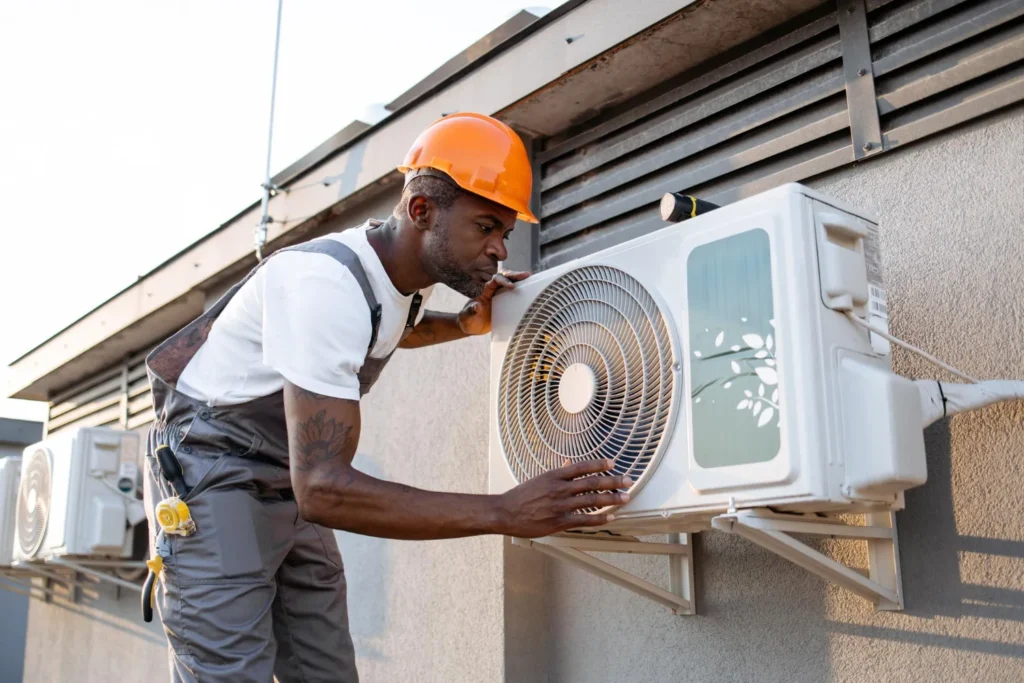When your air conditioning system isn’t functioning correctly, it can be a significant source of discomfort, especially in hot climates like Houston. Recognizing the signs of a malfunctioning AC ensures your environment remains comfortable and your system operates efficiently. Timely identification and repair restore comfort and prevent minor issues from escalating into major, costly repairs. This guide will help you understand how to detect when your AC low on freon, ensuring you can quickly rectify the problem.
5 Signs That You Need AC Low On Freon

Warm Air
If your AC blows warm air, it indicates something isn’t right. This issue often stems from a malfunctioning compressor or inadequate refrigerant levels. It’s essential first to check that your thermostat is set to the cooling mode and that it’s set to a temperature lower than the current room temperature. If, after these adjustments, the AC still expels warm air, the problem may involve a more serious mechanical failure or a refrigerant leak. Immediate attention from a professional technician is advised to diagnose and remedy the issue to prevent further damage to the system.
Insufficient Airflow
Experiencing weak or insufficient airflow from your AC vents can indicate several problems within your HVAC system. Common causes include clogged air filters, which restrict airflow and diminish the system’s efficiency, or issues in the ductwork, like leaks or blockages. A malfunctioning blower motor can also reduce airflow, which may make your system inefficient and lead to compressor failure due to overheating. Regular maintenance checks, such as replacing air filters and ensuring clear and intact ductwork, are essential preventative measures. However, if these steps do not resolve the airflow issue, it likely indicates a more complex problem requiring professional service. Ensuring adequate airflow is vital for effective AC operation and indoor air quality.
Frequent Cycles
Air conditioners are designed to have relatively consistent and predictable cooling cycles, even during hotter days. Suppose you notice that your AC is turning on and off more frequently than usual; this is a sign of what is known as short cycling. Short cycling is irritating and inefficient and can significantly increase your energy bills. Several issues, including an oversized AC unit, incorrect thermostat placement, low refrigerant levels, or electrical problems, can cause it. Since short cycling puts extra stress on your air conditioner, leading to premature wear and tear, it is crucial to address this issue promptly. A professional HVAC technician can help determine the root cause and suggest the best solutions to ensure your system operates as intended.
Water Leaks
Water leaks from your air conditioning unit can indicate several potential issues. While some condensation is normal, excessive water leaking inside or outside your home means a problem. Inside, it could result from a clogged condensate drain line or a rusted overflow pan, and sometimes, it might be due to a refrigerant leak. These scenarios can lead to various problems, including water damage to your home and reduced operational efficiency. Outside, you might notice pooling water around your AC, pointing to similar issues. It’s essential to address these leaks quickly to avoid structural damage to your home and potential health risks from mold growth. Regular maintenance and immediate action upon noticing unusual moisture levels can prevent these complications.
Unusual Noises
An air conditioner should run relatively quietly. If you start hearing unusual noises such as grinding, squealing, or clattering, it’s a significant indicator that something is wrong internally. For example, a grinding noise may suggest that the motor’s bearings fail. In contrast, a squealing noise could indicate a belt connecting the motor to the blower has slipped or is deteriorating. Clattering or banging sounds suggest a loose or broken part inside the AC unit. Ignoring these sounds can lead to severe problems or even total system failure. Early diagnostics and repair from a qualified technician can save you from a costly replacement and extend the lifespan of your unit.
Get Your Air Conditioner Fixed Today
Don’t let a malfunctioning air conditioner disrupt your comfort during the sweltering Houston heat. If you’ve noticed any of the signs discussed above—be it warm air, insufficient airflow, frequent cycles, water leaks, or unusual noises. At 75 Degree AC, we understand the urgency of these situations and are committed to restoring your air conditioning system to its optimal condition swiftly and efficiently.
Our team of certified professionals is equipped to handle any AC repair or maintenance issue with precision and care. We use the latest tools and techniques to diagnose problems accurately and provide practical, long-lasting solutions. Whether it’s a simple repair or a more complex issue, we are dedicated to ensuring your indoor comfort and satisfaction.
Don’t wait for your air conditioner issues to worsen. Contact 75 Degree AC today at (713) 598-2737 or 75degreeacservices@gmail.com. We’re here to help you maintain a relaxed and comfortable environment in your home or business, no matter the weather outside.
FAQs About AC Low On Freon
Is my AC broken, or is it just hot?
Determining whether your air conditioner is broken or struggling to keep up with extreme temperatures can be challenging. If your AC fails to cool your home effectively on sweltering days but works fine, it might not be broken but somewhat overwhelmed. However, if you notice inconsistent cooling, frequent cycles, or any other warning signs previously mentioned, regardless of the outdoor temperature, your AC likely has a problem. In such cases, it’s best to consult with a professional to assess the condition of your unit.
What should you check if the AC is not cooling?
If your AC isn’t cooling your home adequately, here are a few things you can check before calling a professional:
- Thermostat Settings: Ensure the thermostat is set to “cool” and the temperature is lower than the current room temperature.
- Air Filter: Check if the air filter is clean. A clogged filter can restrict airflow and impair the system’s efficiency.
- Circuit Breakers: Sometimes, the solution might be as simple as checking your home’s circuit breakers. Ensure the AC’s breaker has not tripped.
- Condenser Unit: Ensure the outdoor condenser unit is not blocked with debris or leaves, hindering its efficiency.
- If these basic checks don’t solve the problem, contacting a professional to inspect the system is wise.
What are the symptoms of a bad air conditioner?
Symptoms of a malfunctioning air conditioner include:
- Insufficient Cooling: The unit is on, but the air isn’t cooling adequately.
- Unusual Noises: Sounds like grinding, squealing, or clattering are signs of mechanical issues.
- Frequent Cycling: Constantly turning on and off more than usual could indicate a problem.
- Leaks: Any liquid leakage around your AC unit is a concern.
- High Humidity Levels: Your AC should moderate humidity levels during summer. If it feels muggy, the AC might be failing.
How do I check if my air conditioner is working?
To check if your air conditioner is working correctly, follow these steps:
- Listen for the Start-Up: Turn your AC on and listen if the outdoor unit and indoor blower start without unusual noises.
- Check Airflow: After a few minutes, check for cool air blowing from the vents.
- Monitor Thermostat: Observe the thermostat to see if the indoor temperature reaches the set value without excessive cycling.
- Inspect the outdoor unit: Ensure it is running smoothly and showing no signs of excessive frost or leaks.
- If your system fails any of these checks or continues to perform poorly, it might be time to seek professional help.
